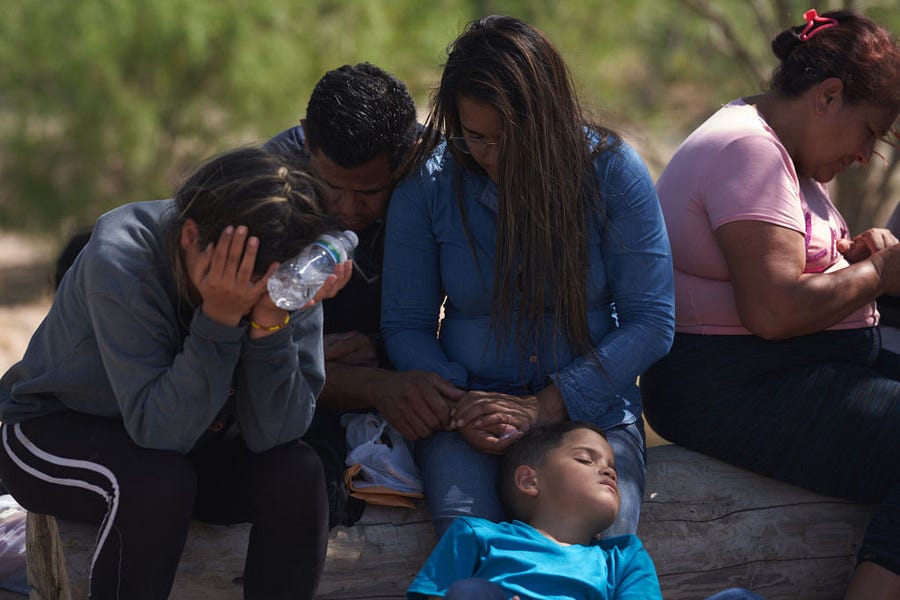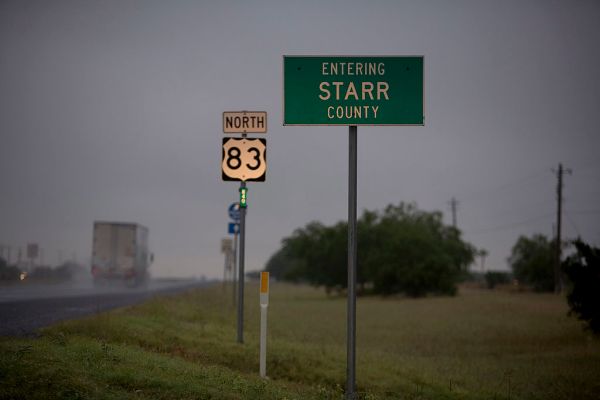Several years ago, NPR reported on a store owner from Honduras who came to the U.S. in search of asylum. She had been brutally attacked by gang members for failing to meet their extortion demands. They poured acid on her arm and beat her so badly that four of her fingers were later amputated. She fled and went into hiding in another part of Honduras. When she returned home five years later, the gang threatened to kill her.
After fleeing to America, she recounted her experience to an asylum officer during her credible fear interview (frequently the first step in the asylum application process), and then showed the officer the acid burn scar and her four missing fingers.
You probably assume that she obtained asylum in the U.S., right? Wrong. She was deported before she could even present her case to an immigration judge. But why?
Most people understand that asylum seekers must demonstrate that they were harmed or will be harmed in their country of origin. But, as so many find out the hard way, they also must demonstrate that they were harmed on account of their political opinion, race, religion, nationality, or membership in a particular social group (PSG).
The standards for that last ground for asylum—a PSG—are easy to recite, but have proven difficult to apply, leading to confusing and conflicting jurisprudence about what groups meet the standard. It can be most easily understood as a group of people who share a certain unchangeable characteristic. There are many recognized PSGs, including “sexual orientation,” “past employment,” “tribe”, and “family,” but a nuclear family, in which everyone shares the unchangeable characteristic of kinship ties, is perhaps the quintessential example. (While many courts have agreed with that assertion, not all parties have.)
But simply belonging to a PSG isn’t sufficient to obtain asylum. If a gang attacks me because I owe them money, the fact that I’m a member of the Fischetti nuclear family isn’t relevant. They simply wanted my money.
However, if they attack me to punish a family member who displeased them in some fashion, then my membership in my nuclear family was, at the very least, one central reason for the attack. That connection between the attack and my PSG would still be apparent even if they also wanted my money.
In my six and a half years as an immigration attorney, I represented hundreds of asylum seekers, but almost never had a case where it could be easily demonstrated that somebody was attacked because of membership in his/her nuclear family or in another PSG. While I wouldn’t take a case unless there was some connection between the harm inflicted and membership in a PSG, such a connection is often tenuous and difficult to tease out. Persecutors are rarely ever nice enough to clearly explain why they are harming someone. Sometimes they give no reason at all.
It’s difficult to demonstrate a nexus between membership in a PSG and the harm an applicant fears, and sometimes it’s even difficult to establish membership in a PSG. (In fact, a 2019 attorney general’s decision almost entirely eliminated the viability of nuclear family as a PSG until it was overturned in 2021.) But suppose a hypothetical asylum applicant were able to demonstrate persecution because of membership in a PSG. Would that be sufficient to win? Not necessarily.
When the persecutor is a private entity, such as a gang, the asylum seeker must also demonstrate that the government is unable or unwilling to provide protection. This was never easy, but a 2018 decision by Attorney General Jeff Sessions significantly increased the difficulty of obtaining asylum in cases where the persecutor was not a government. (This, like the previously mentioned decision to greatly restrict family based PSGs, was overturned in 2021.)
But let’s suppose our hypothetical asylum applicant demonstrates persecution because of membership in a PSG and that the government is unable or unwilling to provide protection. Does he/she win? Again, if the persecutor is a private, non-governmental entity, not necessarily.
When the state is the persecutor, it’s assumed that the applicant cannot relocate within their country. But if the persecutor is a private entity, the applicant loses if it is found that they could avoid persecution by internally relocating.
Returning to our original example, the NPR article didn’t explain why the Honduran woman didn’t pass her credible fear interview. But based on an examination of the facts, the answer becomes somewhat clear.
First, she was persecuted by a private entity. Obtaining asylum is always more difficult when the state isn’t the persecutor, and this was especially true in 2018 when her interview was conducted.
Based on the limited facts presented in the article, there appears to be no nexus between a PSG and the attack. There’s no indication that the gang hurt her because of her family ties or because of any other unchangeable characteristic. Instead, the article suggests that the gang brutalized her because she didn’t pay them. (This doesn’t rule out the possibility that the gang had other motives for persecuting her that would have been discerned had the woman been able to present her case before an immigration judge.)
Finally, the evidence suggests that she could have avoided harm by relocating internally. She lived for five years in another part of Honduras after the assault. The article does not mention her being harmed during this period. (Though that doesn’t necessarily mean it didn’t happen.)
This is not meant to belittle her story. It’s inconceivable to expect that anybody subjected to such unimaginable horrors wouldn’t seek protection. Unfortunately, unless such horrors are inflicted on account of one’s membership in a PSG, by an entity that the government cannot or will not control, and in a country where the victim cannot internally relocate, a gang violence victim will be unable to obtain asylum in the U.S. In fact, they may not even be able to present their case before a judge.
Yet despite our asylum system’s inaccessibility, hundreds of thousands of migrants file claims each year because it is often their only viable option. In the fiscal year 2020, 283,062 migrants filed for asylum.
The U.S. should advance reforms that make our humanitarian system more responsive to the needs of Americans and migrants alike. Improving our refugee resettlement process, so that we can process migrants outside the country, would both help migrants and improve border security.
Currently, refugees can be resettled only by nine government-approved resettlement agencies. This greatly limits the number of people fleeing disaster who can enter the country safely and legally.
Permitting private entities such as U.S. residents and humanitarian groups to sponsor refugees would increase this number. It would also, according to Brian Hastings, former Customs and Border Protection chief of law enforcement operations, reduce illegal migration and help our CBP officers return to “the primary mission of securing our borders.”
The State Department took a positive first step when it allowed private sponsors to help resettle evacuated Afghans and paroled Ukrainians. The State Department should live up to its promise of launching a full private sponsorship program this year that allows groups to pool their own resources to sponsor people for refugee status.
But what about those, like the Honduran woman described above, who are fleeing from their country but don’t meet the stringent asylum/refugee requirements? Expansion of non-humanitarian legal channels would provide a safer and more orderly pathway for them to arrive.
Given her experience as a store owner, the Honduran woman may have been a good candidate for the E-2 visa for certain business investors and employees. But the current program lacks objective standards because each U.S. embassy has its own adjudication policies. This can make it very difficult for otherwise eligible applicants to access the program. In 2017, for example, 2,400 E-2 visas were issued to Mexicans, but only 29 were issued to Hondurans.
It’s possible that many Honduran candidates are denied, or don’t apply in the first place, because they can’t afford to invest $100,000 in a business—which is commonly considered to be the standard level of investment for E-2 applicants. Such a steep investment, however, is not required by law. Also, for the less wealthy, donations and loans are valid sources of investment funding.
To encourage more business owners to immigrate legally, the State Department should list specific criteria and best practices for investors with less capital, including how to lawfully obtain donations and loans.
Migrant families frequently pool their resources to pay human smugglers, so it is highly likely that they would do the same for a safer legal alternative. Finally, the U.S. government should emphasize that there is also a legal immigration option for employees of E-2 business investors of the same nationality.
Although it might not have helped the Honduran woman described above, the U.S. should improve accessibility and awareness to the H-2 visa programs for seasonal workers and streamline the process. Currently, the H-2A visa for agricultural workers contains nearly 70 steps, and the paperwork costs farmers more than $10,000 for every single petition they file.
These barriers are a major reason why only 10 percent of the agricultural workforce have legal status, but as many as 75 percent are working illegally. (The other 15 percent are U.S. citizens.) Additionally, Central American governments have cited lack of knowledge as a major reason why such visas are underutilized by their citizens. The same improvements that would help the E-2 visa programs—streamlining and better awareness—would allow more employers to benefit from legal labor, while decreasing incentives for people to enter this country illegally.
Ultimately, creating orderly and accessible processes for legal immigration is our best option for combatting illegal immigration and the prevalence of good faith, but non-meritorious, asylum claims. Doing so will make both immigrants and Americans safer and more prosperous.
Jordan Fischetti is an immigration policy fellow at Americans for Prosperity.
The author would like to thank his colleague, Sam Peak, for his contributions toward the section on legal immigration solutions. He would also like to thank his former immigration lawyer colleague, Ben Messer, for helping him improve the section on the complexities of obtaining asylum. Messer is currently a senior attorney at Wilkes Legal, LLC, in Tacoma Park, Maryland.








Please note that we at The Dispatch hold ourselves, our work, and our commenters to a higher standard than other places on the internet. We welcome comments that foster genuine debate or discussion—including comments critical of us or our work—but responses that include ad hominem attacks on fellow Dispatch members or are intended to stoke fear and anger may be moderated.
You are currently using a limited time guest pass and do not have access to commenting. Consider subscribing to join the conversation.
With your membership, you only have the ability to comment on The Morning Dispatch articles. Consider upgrading to join the conversation everywhere.